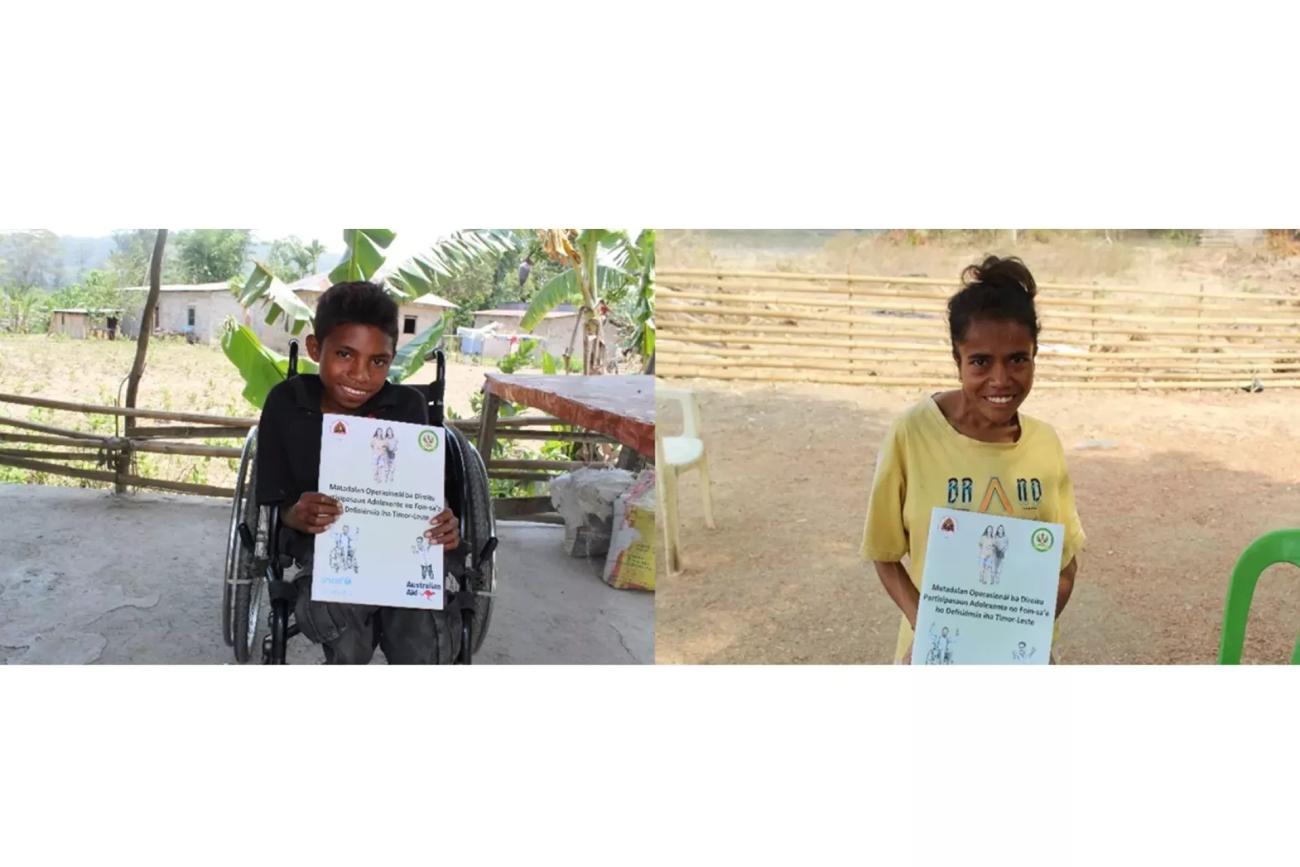Disability Empowerment: Chasing Dreams of a Better Future

Consultations in Ermera have mobilised the engagement of youth with disabilities to determine their own future
Ermera, 13th August 2023 - Leonito de Deus was born a healthy little boy until the age of 2, when his life would change forever. After falling ill from an unknown disease, Leonito started to develop a physical impairment that impacts his spine and his ability to walk. Now 13 years old, Leonito has fought hard every day to receive an education and sense of fulfilment in life. From grade 1 until grade 3 Leonito walked on his hands for miles to reach school in his home village of Letefoho. This impressive feat left him dirty, exhausted, and unable to focus on his studies. With very little energy to stay motivated, Leonito stopped going to school.
Joanico from Ra'es Hadomi Timor Oan (RHTO) an organisation for people with disabilities, reached out to Leonito’s parents and convinced them to let him stay in Gleno with Leonito’s uncle, so that he can receive assistance from the organisation to help him get back to school. Since moving, Leonito has received a wheelchair and found a vibrant community at his school that treats him with respect and kindness.
“I like to play with my friends. They come to play with me at the front of my house, we really love football.”
It is clear that improved access to his school and community has made a tangible impact on his life and his ability to participate however, there is still a lot of work to do to increase access and participation for youths with disabilities in Timor-Leste. Evidence suggests violence and abuse of people with disabilities is still common and key infrastructures lack accessibility measures. While Leonito’s participation in school has increased, there are still key access challenges that he is facing.
“I can’t operate my wheelchair on my own because it’s too big, so I need my family to take me to school. If no one is home, I still have to walk on my hands for 2 kilometres to get to where I want to go.”

There are also no ramps at Leonito’s home, so he must climb down his porch, through the dirt and over rocks to get to the road. Lack of safe footpaths and ramps in the community make Leonito’s commute to school dangerous and inaccessible. The lack of accessible infrastructure at school is another challenge to navigate, as friends and teachers help Leonito to get into the classroom. Establishing a clear guideline on how to better provide access to participation for youths with disabilities is a pivotal move that has the chance to provide lasting impact on the lives of so many.
In July 2022, UNICEF in Timor-Leste, with support from the Australian Government through the Australian NGO Cooperation Program (ANCP), facilitated key consultations in several areas including Ermera, to create a space for youths with disabilities to have their voices prioritised. Recommendations from Leonito and 73 other youths with disabilities have formed a key document called ‘Operational Guidance for the Rights to Participation of Adolescents and Youth with Disabilities in Timor-Leste’.
To date, 208 copies of this document have been disseminated across civil society organisations, government, and communities across the nation. UNICEF is leading the way in ensuring all stakeholders understand children’s needs when it comes to access, so that participation is a key focus in all programs moving forward.
“I am very happy to see my contributions in this document. I hope that it can be used by the government and other organisations to increase participation for people with disabilities. My dream is to be a director of a disability organisation. I want to help support people with disabilities so they can have a life as good as abled people.”
Leonito’s big dreams are echoed by Esperansa Marcal dos Santos, a young 26-year-old woman who proudly participated in this consultation.
“My dream is to run my own organisation with my friends who also have disabilities. I want to make sure people have access to information, support, and services.”
Much like Leonito, Esperansa was not born with her disability. It was not until she became ill at 10 years old that her family took her to the hospital in Dili. After one week in hospital, she was discharged and told to rest at home. One week later her body started to change, and her physical impairment started to form. The sudden change was confusing for Esperansa and left her devastated, trying to grapple with her new life. However, a lifetime of commitment to receiving an education has seen her celebrate the success of completing high school in 2021. Since graduating, Esperansa helps her mother at home with her siblings however, she wants more opportunities for meaningful participation in consultations and trainings. Due to her physical condition, Esperansa cannot walk very far, much less to training opportunities. There is a strong demand for accessible transport options to increase participation in the community.
“I hope that the government and development partners can follow these practical guidelines so everyone can have meaningful participation in the current activities. If these guidelines are not followed, participation is hindered. People need to think about our needs based on our disability.”
Hearing these inspiring stories of local heroes fighting for their right to participation and access, one thing becomes very clear: empowering youth with disabilities to work in leadership positions in disability organisations, to create their own organisations, or to have the right to participate in the workforce, not just empowers youth with disabilities to lead self-determined, fulfilling lives but it paves the way for a more inclusive future. Allowing youth to make decisions on what impacts them is the most sustainable and dignified future to build, and all of this starts with access and participation.


